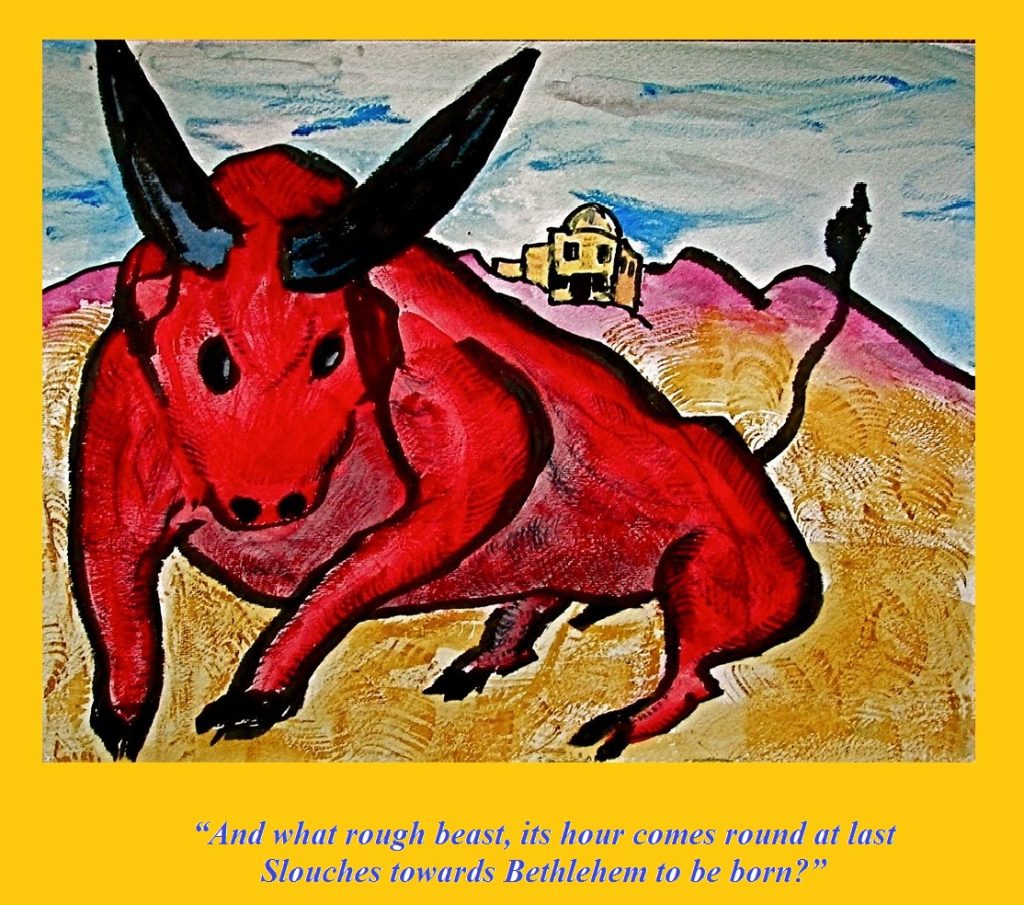The treatment of myth and history is one of the main aspects of Yeat’s poetry. His system as contained in his philosophical work, A vision, is the theoretical basis for the way he handles history and myth in some of his poems. His early poems largely deal with Irish mythology and are pregnant with symbolic meaning. According to himself the nature of civilizations changes after almost every two thousand years.
Table of Contents
Yeats second coming
In the poem “The Second coming”, we get the picture of his theory of the rise and fall of civilization to find an illustration. To the poet civilization and barbarism occur in alternating phases. A civilization changes every two thousand years. Good civilization turns into a bad civilization. Bad civilization is dominated by wars and the decline of traditional standards. Every 2000 years a civilization collapses. In this poem, the 20th century has been called the second coming. To the poet, traditional and aristocratic values of life have been damaged beyond repair. The best people do not know what is good for them. An atmosphere of fanaticism and vidence has overtaken everything. The key lines of this poem:
“Turning and turning in the widening gyre
The falcon can not hear the falconer”
Falcon is a hawk. It is a large bird. It hunts and kills the small creatures. In this poem, Falconer symbolizes Christ or God. To the poet, the falcon does not hear the falconer’s call. These lines mean that man has gone astray and does not heed the words of God. To the poet, our civilization has lost all controlling authority. The poet tells us that things are declining:
“Things fall apart; the center can not hold
Mere anarchy is loosed upon the world”
The disorder is noticed in any sphere of activity. In order to present the real situation the poet focuses on the mythical event of the flood which engulfed and destroyed all life in the world. In this poem the poet recalls the first coming of Christ. The birth of Christ was then welcome but now they are forgetting him:

Easter 1916 poem
In the Easter 1916 Poem, we get the picture of a group of revolutionaries lost their lives in the tragic disaster of 1916. In the poem, the poet gives honor to the revolutionaries. The poem deals with contemporary Irish history. The opening lines of the poem convey the impression that some legendary figures are coming. He says in the following ways:
“I have met with them at close of day
Coming with vivid faces”
The sacrifice of the revolutionaries was very remarkable and bought a dramatic change in the history of humanity. In this poem the heroism of the revolutionaries has been focused. For Yeats the people involved in this revolution had changed everything. Ireland was transformed, changed, changed utterly. He says:
“All changed, changed utterly
A terrible beauty is born”
Easter 1916 poem is one of them. The poem deals with the contemporary history of Ireland. The heroic intensity bad intensity had transcended the cycle of ordinary life and achieved permanence in the midst of unrest. The poem gives us a reference to the people who died in the Easter revolution of 1916. Yeats says in the poem:
“Too long sacrifice
Can make a stone heart
O when man it suffice?”
Prayer for my daughter by wb yeats
In “A Prayer for My Daughter”, we find the echo of the “the blood-dimmed tide in the murderous innocence of the sear”. The poet was troubled and gloomy about the situation in the Western World in the post-war period. There was turbulence in society. At this stage Yeats’s daughter was born. Yeats is concentrated on his daughter’s future in such a world. He says in the following ways in this poem:
“Once more the storm is howling , and half lid
Under this cradle-hood and coverlid
My child sleeps on. There is no obstacle
But Gregory;s wood and one bare hill”
In this poem we get a vivid reference to Helen, to Venus, Aphrodite, to Vulcan and to the horn of plenty. Helen was an extraordinarily beautiful woman. The Greek warrior and general Menelaus got married to her because of her great beauty. But her beauty made her so proud that she found her life with Menelaus dull and boring. Subsequently she ran away with a liver who Trojan Prince named Paris. This cause a bloody war between the Greeks and the Trojans.
Aphrodite is the goddess of beauty and love. She is believed to have emerged from sear-foam. Having had no father, she knew no discipline, and therefore she was merely led by her whims. Because of her undisciplined independence of spirit, she chooses a husband who was most unsuited for her. She got married to the lame god Hephaestus. This even Aphrodite’s beauty proved a curse to her because she was unhappy with her husband and developed an illicit love affair with another god. So the poet feels sure that lovely woman eats some crazy salad with their food, a result of which they develop some crazy tendency. So as to wreck their own lives.
He says in the following ways:
“It’s certain that fine women eat
A crazy salad with their meat
Whereby the Horn of Plenty undone”
In light of our discussion, we may confirm tell that myth and history are the main aspects of Yeats’ poetry. His vision is very clear and vivid.
Read More Related with Literary Writings:
Matthew Arnold Poems as the Criticism of Life or Victorian Age
Robert Browning as a writer of dramatic monologue
Treatment of Nature in the poem of Tennyson


